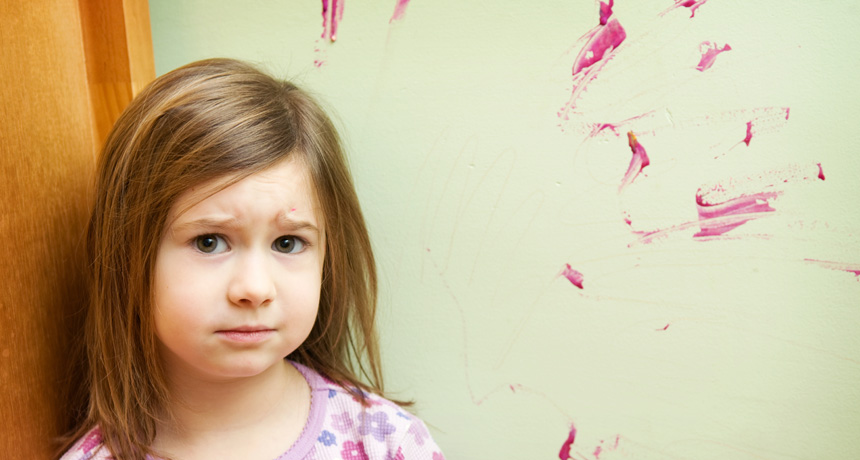The debate over spanking is short on science, high on emotion

There are plenty of opinions on whether you should spank your child when she’s been naughty, but the science of spanking is far from clear.
ideabug/iStockPhoto
- More than 2 years ago
Earlier this month, a star running back for the Minnesota Vikings was indicted for whipping his young son bloody with a switch. Leaked photographs allegedly showed Adrian Peterson’s 4-year-old son with cuts and bruises on his legs, back, buttocks and scrotum.
As details about the incident emerged, Peterson took to Twitter to say that he’s not a perfect parent but what he did was not abuse. It was discipline. “My goal is always to teach my son right from wrong and that’s what I tried to do that day,” he wrote.
Many people, and I’m one of them, think Peterson’s actions were disgusting. There’s no way that hitting a 4-year-old with a switch until his body is cut and bruised is a good way to impart values and morals. Peterson’s extreme actions, done in the name of corporal punishment, ignited a ferocious, emotionally fraught debate over whether it’s OK to hit your kid.
The debate reflects deep divides in our society, chasms that track along political, religious, regional and racial lines. Half of all U.S. parents say they’ve spanked their kid. Spanking doesn’t just happen in the privacy of homes, either. Nineteen states allow teachers or principals to hit children.
Opponents often point to scientific studies as proof that spanking is bad. And I confess, I originally thought this post was going to describe those results that we’ve all heard: how children who have been spanked are more aggressive and have more behavioral problems.
But despite the headlines, the science behind spanking is actually quite limited, says clinical psychologist Christopher Ferguson of Stetson University in DeLand, Fla. “Because it’s a culture war issue, I think a lot of what we hear has misrepresented what is very nuanced science,” he says.
For instance, a large analysis of 88 corporal punishment studies found that children who were physically punished were more likely to be aggressive, show antisocial behavior and have lower mental health. In that analysis, violent actions including punching, kicking and burning were excluded from the analysis. But face slapping, beating and hitting so hard as to cause bruises or cuts were included, making it hard to tease out the effects of gentler swats on the bum.
Another study found that children who were hit by their mothers, but not their fathers, at age 5 were more likely to act out at age 9, researchers reported in 2013 in Pediatrics. But in that study, parents were just asked how many times they spanked their kid in the past month. That blunt approach misses nuances such as whether the hitting was done in anger and whether the child was told why they were being spanked.
It’s impossible to do the perfect randomized, controlled study on spanking. What ethics review would approve a study that requires randomly assigning kids to the spanking condition? So that means researchers have to fall back on observational studies in which they compare kids from similar families that spank or don’t spank. And those comparisons are really hard to interpret. Lots of studies lump together drastically different experiences. One family’s spank might be a firm swat on the fully clothed backside, while in another family, spanking means a belt to a bare bum. One family might spank spontaneously out of anger, while another might treat it as a carefully meted out and fully explained punishment.
And because the studies that have been done are all observational, it’s impossible to cleanly identify cause and effect. Do children become aggressive and act out because they’re spanked? Or are aggressive, misbehaving children more likely to get spanked in the first place? The answer could very well be both, as this recent paper, which relies on complex statistical methods, suggests.
The state of the science, Ferguson says, is like a tennis match, constantly sending new volleys over the net. “One group says ‘I find this correlation.’ And another group says ‘well, you found it for the wrong reason,’” he says. “And it goes back and forth.”
Aside from potential damage that spanking might cause kids, there is still the question of whether it actually makes a child behave. Is spanking way better than other types of discipline? The answer might depend on how you spank, an analysis of other studies suggests. A spank as a last resort, to discipline a kid who keeps escaping time-out, for instance, seems to get better results than other discipline techniques. But when spanking is the go-to discipline measure or when it’s severe, it becomes less effective than other techniques. Most parents who spank probably fall somewhere between these two extremes, and for them, spanking seems to work about as well as other methods of punishment, the results suggest.
Growing up in Tennessee, I didn’t blink an eye at the paddles that hung on the walls of my classrooms, some riddled with holes for maximum speed. I never experienced their sting myself, but plenty of kids did. One of my brothers just finished telling me his extensive paddling history that spanned from second grade, when we first arrived in Tennessee, to middle school. My parents never knew, but he was paddled in every grade.
Now that I’m a parent, the idea of anyone, including me, hitting my 19-month-old daughter makes me cringe. Without any regard for what science says, I simply can’t rationalize a big person hitting a small, helpless one to teach them how to act. What’s more, children learn by watching what their parents do, not by listening to what they say. (Remember how lying to kids makes them lie more? Why would hitting be any different?)
But I’m also not the parent of a 5-year-old who routinely runs into traffic. Maybe when I’m faced with that situation, a swat on the backside will seem like an effective way to keep my daughter safe. I don’t presume to know how I’ll discipline my daughter in the future, nor do I presume to judge other parents’ (non-abusive) discipline choices.
Still, prominent child abuse cases like Peterson’s highlight an insidious aspect of spanking: Sometimes, hitting a child in the name of discipline morphs into something far worse. It’s not hard to imagine an angry parent quickly losing control and crossing a line. And that’s not discipline—it’s abuse. So as Adrian Peterson was hitting his son to teach him to be kind to his brother, I wonder what lesson came through.
Follow me on Twitter: @lssciencenews







